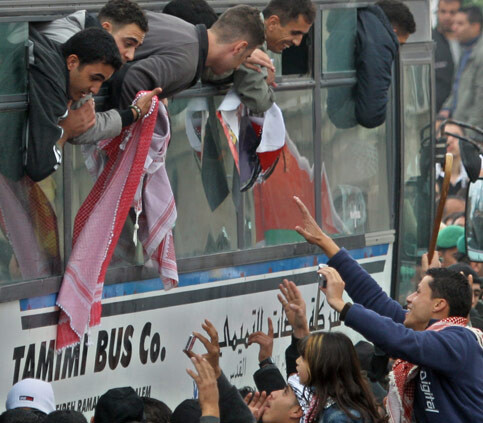
Some of the 429 Palestinian prisoners released by Israel are greeted by relatives as they arrive into Ramallah, 3 December 2007. (Luay Sababa/MaanImages)
Thousands gathered at the presidential compound in Ramallah on 3 December 2007 to welcome 429 Palestinian prisoners just released from Israeli jails as part of what Israel has called a “goodwill” gesture. Nonetheless, behind the cheering and flag waving, the feeling was bittersweet as the families of the released were overjoyed to have their loved ones returned, while there remained an atmosphere of cynicism towards Israel’s “gesture.”
Addameer, a Palestinian prisoners’ support and human rights organization, estimates that there are more than 11,200 Palestinians in Israeli detention. This figure includes 104 women, 375 children, and 19 mothers whose children are imprisoned with them.
Israel’s release was intended to demonstrate a commitment to the process put forward at the meeting in Annapolis, Maryland last week. Yet since the meeting was announced in July, the Israeli military has arrested an additional 1,818 Palestinians according to the Palestinian Liberation Organization’s Negotiations Affairs Department (PLO NAD). In addition to these arrests, another 46 Palestinians were arrested in West Bank raids the night before yesterday’s release.
Having just stepped off the bus, enjoying his first taste of freedom from detention in eight months, Mohammed Samer Asfoor describes regular violent treatment and torture from prison guards while in jail. “They beat us with sticks and used teargas on us all the time, like everyday,” he says. Asfoor maintains that he is not aligned to any of the Palestinian political parties and was first arrested at his house during a West Bank nighttime raid.
Standing in the middle of the compound holding a framed picture of her son in his early twenties, awaiting his release, Hanan Mohammad Mir’ee contends that she is still unclear as to the exact charges that were leveled against her son or the context in which he was arrested. “We don’t know what the charge was exactly. He was taken from a checkpoint and the [Palestine Red Crescent Society] told us that he was arrested and sentenced to five years,” she says. She describes her son as a Fatah member, saying that like most youth, he was politically active, throwing stones at the Israeli military during the second intifada. Released after serving two years and three months, Mir’ee adds that she was only allowed to visit her son once every three months.
The Palestinian Authority’s (PA) Minister for Prisoner Affairs, Ashraf al-Ajrami, basked in his perceived victory while using the opportunity to demand the full release of Palestinian prisoners. “It is a very important step for the Palestinian side to release any Palestinian prisoner. However, we think that the Israeli government is dealing with this issue wrongly. We want the release of thousands of prisoners, especially because we are speaking of 11,000 prisoners in Israeli jails,” he says.
He was also critical of the increase in arrests since the announcement of Annapolis and Israel’s policy of differentiating in the prisoners they release, refusing to free those involved in armed action against Israelis. However, al-Ajrami backtracked over the issue of coordination between PA security forces and the Israeli military, denying PA involvement in aiding Israel in arresting suspected resistance fighters. “No, the Palestinian security forces arrest people who do things against the Palestinian security, not the Israeli security,” he maintains.
In Nablus, the Palestinian Security Forces have an arrangement with the Israeli military whereby the PA police the city from 6:00am to midnight and the Israelis take over after that. In the West Bank the Israeli forces generally carry out arrest raids between midnight and the early hours of the morning.
Khalida Jarrar, former director of Addameer and currently a member of the Palestinian Legislative Council representing the Popular Front for the Liberation of Palestine — a secular Marxist Palestinian liberation movement and the second largest member of the PLO — blasted the PA for the arrangements with the Israeli military. “We criticize and are against the security coordination between Palestinian security forces and Israel. We demand that the [PA] stop this and protect the freedom and rights of Palestinians to oppose the occupation,” she says.
Jarrar also challenges al-Ajrami’s perspective that yesterday’s release was a step forward, contending that it distracts attention from the central issue. “Any Palestinian is happy with the release of any prisoners, but on this day when we are talking about releasing 400 prisoners, thousands of Palestinian prisoners remain in Israeli prisons,” she says. “There are no prisoners released from Jerusalem and none from 1948 [Israel],” adds Jarrar describing the prisoners as freedom fighters and challenging the Israeli policy of treating them as criminals.
She argues that all Palestinian prisoners are freedom fighters because they resist the occupation, and that Israel will be unable to divide Palestinians on this issue through different classifications of prisoners based on acts of resistance or political allegiance. Highlighting the dominance of West Bank Fatah-aligned prisoners in yesterday’s release, Jarrar maintains that Israel is trying to use the release to divide Palestinians along party and geographic lines. “The Israeli game of trying to differentiate between prisoners on the basis of their faction or geography will fail because all the Palestinians have one cause, a real release for Palestinian prisoners.”
Jesse Rosenfeld is a freelance journalist based in Ramallah. This article was originally published by Palestine Monitor and is republished with permission.
Related Links





